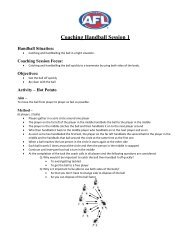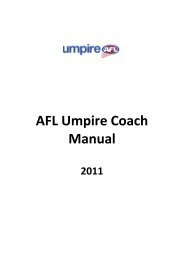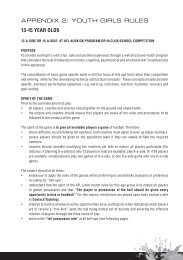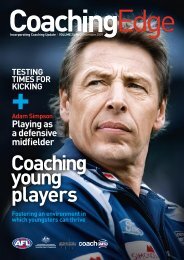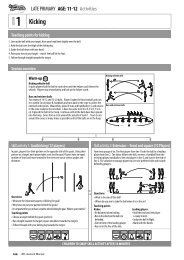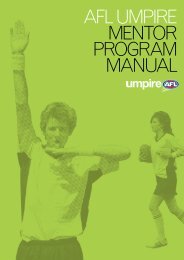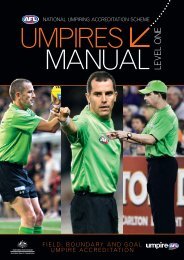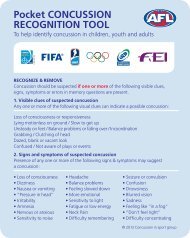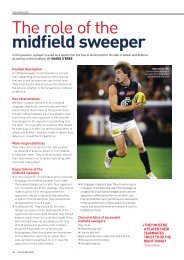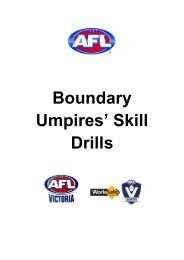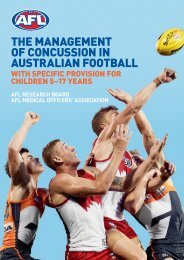2012 Youth Coaching Manual - AFL Community
2012 Youth Coaching Manual - AFL Community
2012 Youth Coaching Manual - AFL Community
Create successful ePaper yourself
Turn your PDF publications into a flip-book with our unique Google optimized e-Paper software.
Promoting emotional well-being<br />
One of the most critical approaches to promoting emotional well-being is to provide adolescents with the opportunities and<br />
skills to genuinely participate in all aspects of community life. This sends a strong message to young people that what they<br />
say is valued and that their contributions are worthwhile. The most important traits that characterise resilient adolescents<br />
are social competence, problem-solving skills, autonomy and a sense of purpose. Caring and support, high expectations and<br />
encouragement of participation are also important. Expecting too little will undermine young people’s motivation more so<br />
than when too much is expected. Adolescents are frequently denied opportunities to take responsibility. They need to have<br />
opportunities to individually and collectively take responsibility for shaping their world.<br />
Many opportunities exist for adults to notice adolescents and make them feel that they and their contributions are valued. Coaches<br />
and other significant adults should do this through encouraging them, helping them, putting yourself out for them, showing<br />
interest in their lives and generally conveying to them that you, as coach, like them and that you are genuinely interested in their<br />
well-being. The power of simple feedback like a smile, a verbal thank you or a note of thanks should not be underestimated.<br />
Adolescent needs<br />
Some of the things adolescents need that coaches should be mindful of includes:<br />
• A chance to experiment.<br />
• To be accepted for themselves.<br />
• Security.<br />
• People to take an interest.<br />
• Praise.<br />
• Understanding.<br />
• To be trusted.<br />
• To do adult things.<br />
• Space of their own.<br />
• To have friends.<br />
• To make their own decisions.<br />
• Independence.<br />
• To feel useful.<br />
• Appropriate affection.<br />
• Reasonable rule limits.<br />
• To test boundaries.<br />
• Flexibility.<br />
• Responsibility.<br />
• Their own privacy.<br />
• To be successful.<br />
• To be taken seriously.<br />
• Consistency.<br />
• To be listened to.<br />
• To choose their own friends.<br />
• For it to be OK to fail.<br />
• To be fashionable on their own terms.<br />
• Not to be made to feel awkward.<br />
• Not to be always criticised.<br />
• Help and advice when asked.<br />
• To try out new things.<br />
<strong>AFL</strong> <strong>Youth</strong> <strong>Coaching</strong> <strong>Manual</strong><br />
171



